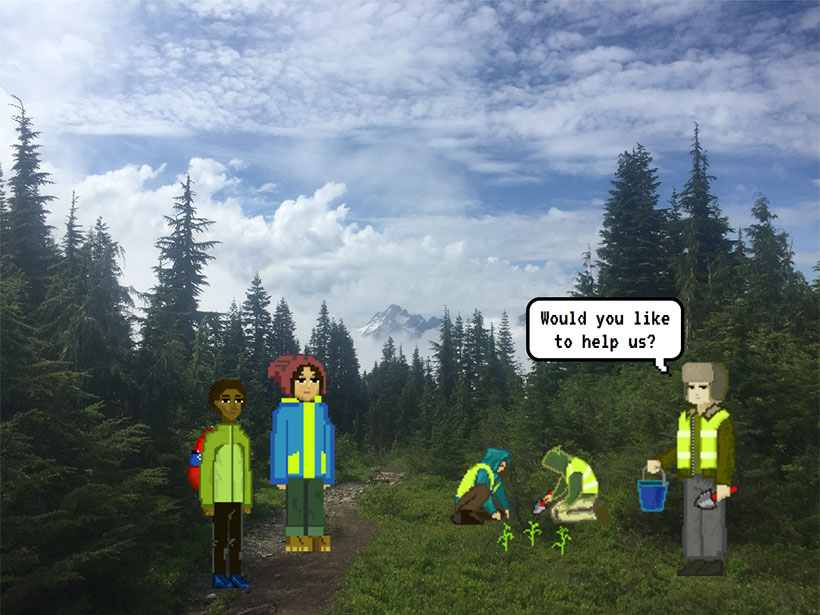Looking for fun and educational games to play with your family this holiday season? Still searching for a stocking stuffer? Wish your vacation days had more geoscience in them? (Alright, maybe not that last one.)
We’ve got you covered. These games, designed by scientists and educators, teach people of all ages about planetary science, environmental conservation, and natural disaster preparedness.
This winter could be filled with geoscience-laden games for everyone, so shuffle that deck of cards, boot up a computer, or switch on a tablet and enjoy these play-and-learn geogames. Some games are still in development, but make sure to bookmark them for next year.
Where’s Water?
This deck trades hearts, diamonds, spades, and clubs for planets, moons, and asteroids to teach where water has been found in the solar system. One side of the cards shows a high-resolution image of a solar system body, its gravity compared to Earth’s, its location in the solar system, and whether it’s made of rock, gas, or ice. The backs of the cards show what type of water reservoir exists on that object and how much water the reservoir has. The 40-card deck, part of a game called Water in Extreme Environments, was designed by a collaborative team of planetary scientists and educators.

Water in Extreme Environments is just one game from the Planetary Learning that Advances the Nexus of Engineering, Technology, and Science (PLANETS) collective. You can also use games to dig deeper into STEM topics like remote sensing and space hazards.

Earth Girl to the Rescue
Help save a town from a volcanic eruption before a disaster strikes in Earth Girl Volcano. This strategy game teaches about volcano risk, disaster management, and preparedness in scenarios inspired by real-life communities next to the Pacific Ring of Fire. Players can pick from small villages, populous towns, and industrial parks. They design disaster mitigation strategies by assessing danger areas, educating the population, building infrastructure, or introducing new technologies. The video below shows more of how the game works.
After saving virtual communities from eruptions, ash falls, mudflows, and burning clouds, players can prevent more disasters in the first two games of the series. Children of all ages can strategize to help a coastal community survive a deadly tsunami in Earth Girl Tsunami.
Both games are freely available for download in multiple languages on tablet platforms.
Become a Deputy Park Ranger

Journey through a forested national park in National Park Adventure, a Web-based interactive computer game. Players explore trails and learn about the plants, animals, and land in the park. They discover how national parks help preserve cultural and historical locations and realize how climate change is affecting the country’s outdoor environments.
The EarthGames group at the University of Washington in Seattle developed the game to be played by students before they visit a park and also to make national park experiences available to those who cannot access a park.
Minigames and side quests peppered throughout the game teach valuable outdoor skills like how to pack, read a compass, and follow a trail map. Players identify and weed invasive plant species, thin a forest before a beetle infestation, and practice how to respect the environment inside a national park. After exploring the park, a player will earn Deputy Ranger status and be ready to explore real-world national parks.
The More Explosive, the Better
Which volcano is most explosive? Most devastating? Tallest, deadliest, or most unpredictable? Test the might of your favorite volcano against your opponent’s in Volcanoes Top Trumps. The game, created by volcanologists, teaches players about plate tectonics and some of the world’s most famous volcanoes. The game is playable as a deck of cards or online, and profits go to a research project that aims to improve volcano forecasts.
The 30 volcanoes included in the deck represent different styles of eruption, span every continent, and range in activity level. Game cards include an image of the volcano, geologic or historic facts, and game stats to play volcanoes against each other. A volcano’s stats are based on metrics determined from real data about a volcano’s size, predictability, historical deadliness, explosivity, and potential devastation.
The game team’s subjective “Wow! Factor” also makes these cards an excellent resource when deciding your favorite volcano in the annual Volcano Cup on Twitter.
Check out the winner of the 2018 Volcano Cup, Indonesia’s Krakatau:
Kick back and enjoy these geobased games. This winter, geoscience education and gaming fun can work hand in hand.
—Kimberly M. S. Cartier (@AstroKimCartier), Staff Writer
Citation:
Cartier, K. M. S. (2018), Geoscience games to liven up your holiday season, Eos, 99, https://doi.org/10.1029/2018EO112429. Published on 21 December 2018.
Text © 2018. The authors. CC BY-NC-ND 3.0
Except where otherwise noted, images are subject to copyright. Any reuse without express permission from the copyright owner is prohibited.

